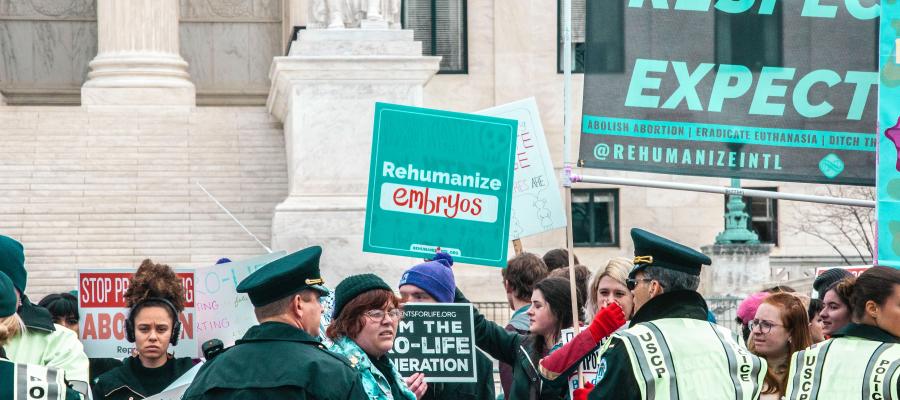From time to time, pro-life advocates argue that those who take a pro-choice position routinely dehumanize the unborn, paving the way for murder-by-abortion. Every so often, my own work on dehumanization is appropriated to make such arguments. In this essay and the next I want to show why these arguments don’t hold water.
Let’s begin with a dehumanization claim, as summed up in a comment by the journalist Kathleen Parker in an op-ed for The Washington Post, “When we use language to disguise reality — whether the developing human baby is a ‘clump of cells, a ‘fetus,’ or, even, a ‘product of termination’ — we move ever-closer to the dehumanization of us all.”
Although Parker’s claim is about the special case of late-term abortion, her comment concerns the developing, unborn human being at any stage. Thinking of the living thing within the maternal womb as anything other than a developing human baby falsifies reality and thereby facilitates the mass murder of innocent human beings.
It's important to notice right off that Parker assumes something that is at stake in the disagreement between pro-life and pro-choice advocates, namely the question that the living thing growing inside of the womb is a human baby. I’ll set this issue aside for the moment (I’ll return to it in next month’s installment), and concentrate on a different one: the question of whether those who think of the unborn as a clump of cells, fetus, or product of termination thereby commit an act of dehumanization.
Here, a complication arises, because “dehumanization” does not have a single, straightforward meaning. There’s disagreement among researchers about exactly what dehumanization is. In this essay, I’m mainly concerned with the conception of dehumanization that I’ve set out in my writings on the subject. In my view to dehumanize others is to think of them as subhuman creatures. Dehumanizing groups of people in this way facilitates acts of lethal violence against them. It’s a regular feature of genocide and other mass atrocities. So, from the pro-life perspective, if people dehumanize developing human babies, they thereby foster acts of violence against them. Just as Nazis dehumanized Jews, and Hutus dehumanized Tutsis, those who conceive of the unborn as anything other than human babies are accessories to mass murder.
Consider an article titled “Is dehumanization always and intrinsically unjust?” In it, the author, Michael Spielman, describes having written to me with the following series of questions:
Socially speaking, have you ever encountered a scenario in which you found "subhuman" to be a legitimate classification? Your book is saturated with examples of human beings who have been erroneously categorized as "less than human," for all sorts of despotic ends. But did you ever come across a case of dehumanization that you found to be morally defensible? If not, would it be fair to say that any effort to dehumanize a group of human beings is always and intrinsically unjust?
The title of Spielman’s essay doesn’t match its content, which doesn’t address the question of whether dehumanization is always intrinsically unjust. Rather, it takes for granted that dehumanization is intrinsically unjust, and then goes on to say that “abortion is ground zero in the contemporary intersect between public policy and dehumanization.”
Can you think of any other institution that is propped up on the explicit dehumanization of its victims? Though racism remains a massive global problem, nobody argues in public that immigrants, refugees, or ethnic minorities are less than fully human—and yet this is exactly the argument that's being made in the context of abortion.
Let’s consider these first two steps. The first premise—that dehumanization is inherently unjust—seems reasonable enough. Its in the second premise—that proponents of abortion dehumanize unborn children in exactly the same way that immigrants, refugees, and ethnic minorities are dehumanized—that problems emerge. To see why, glance back at my definition of what dehumanization is. None of the terms listed by Parker, or commonly used by those in the pro-choice camp, describe the unborn as subhuman animals. Furthermore, in real cases of dehumanization of the sort that leads to mass murder, the dehumanized group is thought of as dangerous and unclean—as creatures akin to rats, cockroaches, or monsters and demons. This is very far removed from talk about an embryo a fetus, or a clump of cells.
Other difficulties abound. As I explain in detail in my recent book On Inhumanity: Dehumanization and How to Resist It, dehumanization is essentially bound up with race. Before they are dehumanized, groups of people are racialized. They are imagined to belong to an alien and inferior race. Dehumanization is racism on steroids. And dehumanizers think that like race, subhumanity is transmitted biologically by descent: if an individual is subhuman, it must be the case that at least one of their parents is subhuman too.
Neither of these criteria apply in the abortion case. Pro-choice advocates to not suppose that there is a race of fetuses, or that their mothers and fathers are subhuman creatures. Finally, to top it off, those who dehumanize others hold that subhumans cannot transform into humans by any natural means. Subhumanity is a life sentence. But even the most ardent pro-abortion people fully accept that fertilized ova naturally develop into human babies.
So, the claim that supporters of abortion dehumanize unborn babies is badly flawed. This is also true for other mainstream theories of dehumanization, for somewhat different reasons. But there is a response available to the enemy of abortion. She might concede that dehumanization is irrelevant to the moral controversy around abortion, but also claim that denying the humanity of the unborn is something very much like dehumanization. She might add that such denials of humanity are both false and profoundly reprehensible, and that objecting on the grounds that this is not dehumanization gives exaggerated weight to mere theoretical technicalities.
To evaluate this defense, we’ve got to dig deeply into the concept of the human. That will be the topic of next month’s installment.





